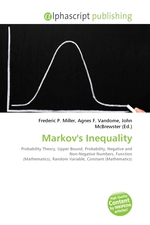Markovs Inequality
Frederic P. Miller, Agnes F. Vandome, John McBrewster
бумажная книга
High Quality Content by WIKIPEDIA articles! In probability theory, Markov's inequality gives an upper bound for the probability that a non-negative function of a random variable is greater than or equal to some positive constant. It is named after the Russian mathematician Andrey Markov, although it appeared earlier in the work of Pafnuty Chebyshev (Markov's teacher), and many sources, especially in analysis, refer to it as Chebychev's inequality or Bienayme's inequality. Markov's inequality (and other similar inequalities) relate probabilities to expectations, and provide (frequently) loose but still useful bounds for the cumulative distribution function of a random variable. An example of an application of Markov's inequality is the fact that (assuming incomes are non-negative) no more than 1/5th of the population can have more than 5 times the average income.
Данное издание не является оригинальным. Книга печатается по технологии принт-он-деманд после получения заказа.


